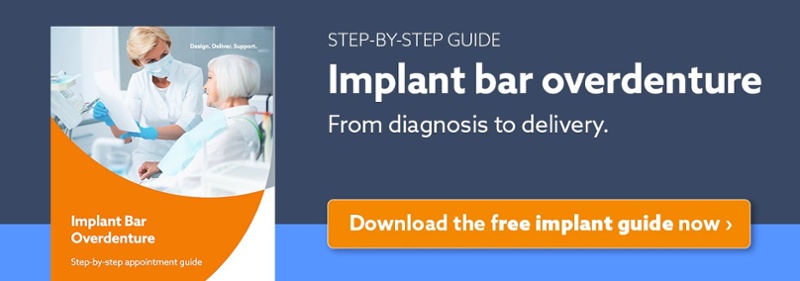Edentulous patients frequently find conventional dentures uncomfortable and unsatisfactory. Because of this, using dental implants to retain or support ill-fitting dentures is becoming increasingly popular.
A study of patient satisfaction and treatment efficacy in 2011 compared three-implant-supported fixed dentures with two-implant-retained dentures. These options were assessed by twenty edentulous patients who were randomly assigned to each group. The study found that both treatments had similar benefits for patients: both treatments were found to have positive and significant effects on patient satisfaction and on the quality of life for those who participated in the study. Click here for more details.
Implant supported dentures offer different benefits when compared to implant retained dentures, but both options can provide improved denture stability and bite function. Often, the decision as to which treatment is best will be based on several different factors.
Overall benefits of implant dentures:
- Help preserve the jaw bone and can prevent further deterioration
- Boost self-esteem and esthetics
- Easier time speaking and eating solid foods
- Improved comfort and overall health
Implant Supported Dentures
Implant supported fixed dentures will take the full force of the bite, absorbing it through the implants and into the jawbone, providing the most natural and effective bite for patients. However, treatment is usually more expensive since a greater number of implants are required and often mini dental implants will not be suitable for treatment. Implant supported dentures are usually best for patients with a high upper smile because the replacement can help hide where the denture meets the natural gum line.
Implant supported dentures also need good quality bone which is not always available. Some patients are reluctant to undergo additional procedures, such as bone and soft tissue regeneration, that could be necessary to ensure the treatment is successful and will provide a good esthetic outcome. When this is the case, implant retained dentures could be a more appealing choice.
Implant Retained Dentures
With implant retained dentures, the gums will absorb more of the force of the bite. Fewer dental implants are required, so treatment is more cost-effective and often it may be possible to use mini dental implants. Dental implants can frequently be situated to maximize use of available bone in areas where it is naturally thicker and stronger, diminishing or eliminating the need for bone grafts. While these dentures help to restore a patient’s ability to talk confidently and to eat comfortably, they do not fully replicate a natural bite and must be removed at night and for cleaning. Implant retained dentures provide more support than traditional dentures, but there is more of a chance of your patient’s getting sore spots. It’s important for patients to know that you might have to reline this type of denture occasionally because, as a patient’s bone and tissues change over time, the fixture will need to be adjusted for a precise fit.
Factors that will influence a patient’s choice of treatment and their clinician’s recommendation include health, lifestyle, diet choices, and cost.
Health
Patients with TMJ or sleep apnea will usually find it more comfortable to be able to wear their teeth at night and could benefit from the support provided by strong, well-fitting teeth. In this case, implant supported dentures could be a better solution, particularly when stronger materials are used to fabricate the restoration.
Lifestyle
Some patients abhor the thought of having removable teeth, due to the permanent reminder of their tooth loss, and would prefer to wake up with teeth that are permanently fixed in place, unless removed by their dentist. For these patients, the psychological benefits of implant supported dentures could be considerable.
Diet
A patient that does not mind avoiding hard-to-chew foods will probably be comfortable with implant retained dentures, especially if they have already spent years on softer, easier-to-eat diets and have grown to prefer these foods. It is a different story for patients who love to eat steak or other foods that require more chewing. If a patient who prefers eating chewier foods chooses to opt for an implant retained denture, they should be made fully aware of how this will affect their food choices.
Cost
For most patients, cost is an important consideration. One important factor to keep in mind is payment plans that offer patients little to no interest. Available payment plan options can help patients make the best choice possible for their recommended treatment plans.
Generally speaking, the fewer implants you need, the lower the overall cost. However, that comes with less stability in the denture. Implant supported dentures are more expensive but may be perceived as providing greater benefits. Provided that patients are aware of all the potential pros and cons, there is every chance they will be happy with whichever treatment they choose. Speak with your patients about finding the right balance of quality and affordability.
Please be reminded that our experienced technical team is available to assist you, should you wish to discuss an implant case in more detail.
Click here to schedule a consultation with our technical team ›
